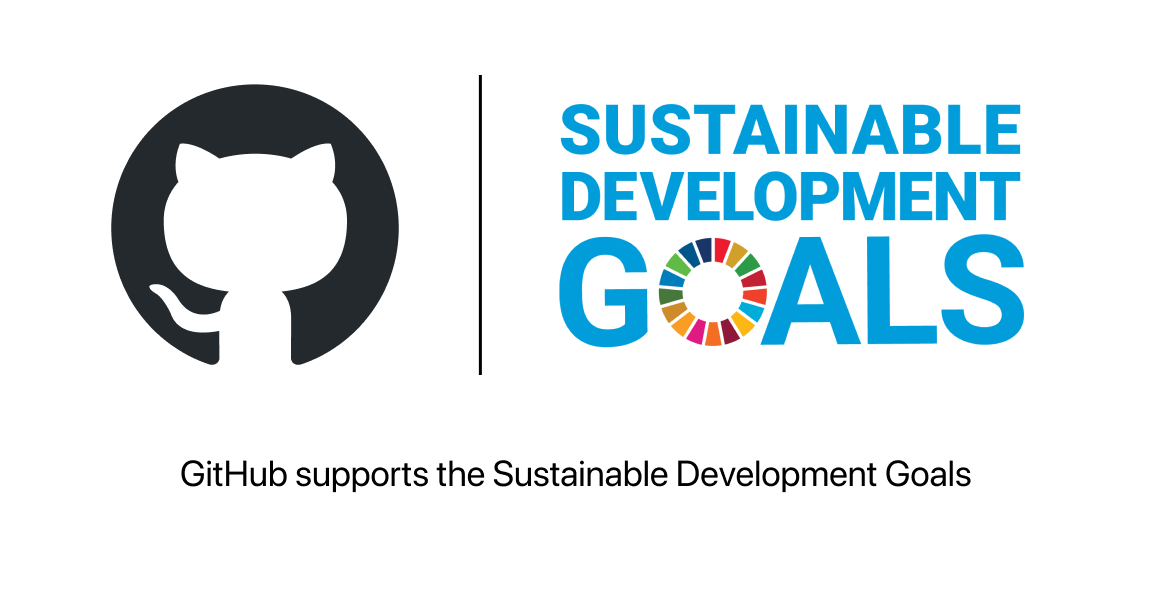Introduction
The Sustainable Development Goals (SDGs) is a powerful framework by which the United Nations (UN), the broader international development community, governments and funders measure human progress. Building off of the Millennium Development Goals, which ended in 2015, there are 17 SDGs and 169 targets that cover everything from public health, to education, to gender equality, to the environment and more.
The main goal of Tech for Social Good at GitHub is to support social sector organizations that design, build, and deploy technology tools and software that contribute to the SDGs. Our work therefore also aligns with the SDGs, whether it’s through open source research for the social sector, helping social sector organizations use GitHub to strengthen their work, or connecting our own employees to Skills-Based Volunteering projects.

Here’s a look at how Tech for Social Good supports two SDGs.
Every aspect of Tech for Social Good touches on SDG 9, which focuses on technology infrastructure, research, innovation and support to low- and middle-income countries. In 2019, Tech for Social Good began a year-long research project that ultimately led to our Open Source Software in the Social Sector report. The report offers a comprehensive look at the intersection of open source software and social good—and many of the featured social sector organizations in the report work mostly or exclusively in low- and middle-income countries.
This research was the catalyst for launching the MERL Center (monitoring, evaluation, research, and learning), a new open source community that creates resources for MERL practitioners to understand if, how, and when to use open source technologies. One focus of the MERL Center is to create case studies about social sector organizations working in low- and middle-income countries. The MERL Center is an inclusive and diverse community, with members who are from and/or live in more than 13 countries in five continents, including sub-Saharan Africa and South Asia. Most members are from underrepresented demographic groups in tech, and more than a quarter of its active members are women of color. (1)
Several of the organizations that provide volunteer opportunities to GitHub employees for our Skills-Based Volunteering program also work in low- and middle-income countries, driving even more support for SDG 9. These organizations include the UN Development Programme (UNDP) and the District Health Information Software (DHIS2).
SDG 3 is largely met through the field of public health, and as we’ve mentioned at GitHub conferences - like Satellite 2020 and Universe 2020 - there’s a long and rich history of public health organizations using GitHub to build their tech products. In response to COVID-19, Tech for Social Good spent much of 2020 tapping into and strengthening this ecosystem. Our support went to social sector organizations working in public health on all aspects of SDG 3, and in particular on target 3d:
Strengthen the capacity of all countries, in particular developing countries, for early warning, risk reduction and management of national and global health risks.”
At Universe 2020, the World Health Organization (WHO) spoke about its Public Health Intelligence and Go.Data applications, and their role in identifying COVID-19 as a potential global health threat and scaling to meet global contact tracing needs. We’ve had the privilege of supporting WHO since June 2020, in part to help them build out an open source ecosystem around their work.
During Satellite 2020, three social sector organizations spoke about their work on software applications that deliver contact tracing, contactless biometrics verification and an out-of-the-box COVID-19 digital management system for the government of Ethiopia.
What’s Ahead in 2021?
We’re excited to take our programs to the next level in support of the SDGs in the next year. Building on our previous work on SDG 9, we’ll launch a second Open Source Software in the Social Sector research project that will focus on low- and middle-income countries that have a strong tech maturity. We’re also continuing our work with the social sector to address pain points it faces with open source discoverability, capacity building, and networking. One area we’re particularly excited about is with UNICEF and the Digital Public Goods Alliance.
Skills-Based Volunteering is another exciting opportunity area for us, as we engage new partner organizations working across SDGs 2, 3, 9, 13, and 16. We’re documenting our progress and will launch open source assets to allow other organizations using GitHub to replicate the program we created.
As we scale our programs, we also hope to more actively engage social sector tech communities in our work through virtual seminars, events, and communications. Be sure to follow along on this site, where we’ll post announcements.
1) Note that the MERL Center also relates to SDG 5: Achieve gender equality and empower all women and girls and specifically Target 5.b: Enhance the use of enabling technology, in particular information and communications technology, to promote the empowerment of women.





